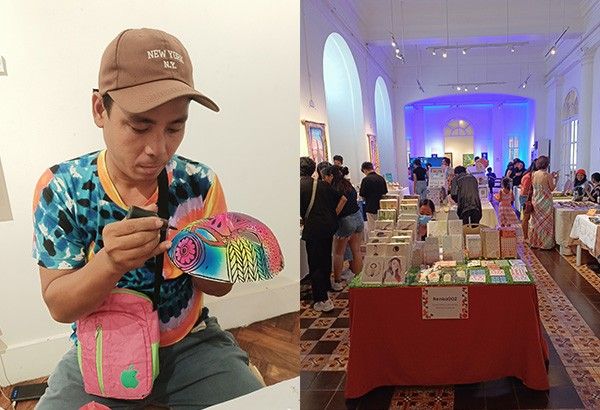NCCA celebrates Philippine Creative Industries Month in Western Visayas

MANILA, Philippines — The National Commission for Culture and the Arts (NCCA) recently celebrated the Philippine Creative Industries Month in the cities of Bacolod and Iloilo in Western Visayas.
The three-day affair saw sessions on weaving, mask-making, cooking demonstrations, literary discussions, sketching and tattooing as guest speakers pointed out the culture of Filipino creativity and the respect for artistic rights. This intangible right and its physical manifestations are enshrined in Section 13, Article 14 of the 1987 Constitution on Arts and Culture.
Simply dubbed "The Future is Creative," resource persons talked about the intellectual property rights inherent in creative industries. Culture and commerce conjoin together to result in a creative economy. Republic Act 11904 (RA 11904) provides for the promotion and support of these creative industries.
"This is Western Visayas' contribution to the celebration of Creative Industries Month. Occidental Negros, for instance, is the home of artists and artisans even before the Creative Industries Law was drafted. RA 11904 is the landmark law that intends to grow our creative economy. Although it is an evolving concept, it accounts for 7.3% of our gross domestic product (GDP); close to the agriculture sector (8.6%), but higher than tourism (6.2%). The law has only been approved last year, but it was filed as early as 2008 by Sen. Manny Villar," said Rep. Francisco Benitez, vice-chairman of the special committee on Creative Industries at the House of Representatives, before students and participants from various schools and agencies during a lecture-forum at the University of St. La Salle gymnasium in Bacolod City.
The Intellectual Property Office (IPOPhil), which is one of the pertinent agencies protecting the rights of artists and creators, has seven bureaus that take care of specific actions. These include patents, trademarks, utility models, industrial design, geographical indicators, layout designs for integrated circuits, among others.
Creatives and artisans on the spotlight
In Iloilo, the Avanceña-Camiña Balay nga Bato, presented two of its well-loved food options in a cooking demo. Joe Glenn Lucio told the spectators that in preparing Pork Binuog, slices of lean pork meat were simply salted then slowly roasted for three hours in slow fire.
Ladylyn Sumagaysay, on the other hand, prepared tsokolate (chocolate) from tablea (tablets of roasted cacao beans) harvested from the Avanceña-Camiña Spring Bloom agrifarm in Guimaras and Pavia towns, while using a batirol (wooden whisk) made from a guava tree. She said the guava batirol gives a better texture and taste when compared to others made from other tree trunks. The Tsokolate Espresso she prepared was paired with Ibus sa Isla, a delectable suman (sticky rice cake) variety.
Minviluz S. Camiña, a fourth generation descendant of the Avanceña-Camiña clan, invited the audience at the demo to taste the two delicacies. Their beautifully preserved house that was turned into a museum and gourmet kitchen was given a historical marker by the National Museum. The Camiña Bahay na Bato has become a tourist destination in Iloilo's Arevalo district.
Workshops, demos and lectures filled the three-day conference in both cities of Bacolod and Iloilo. On closing day, the Negros Museum rolled out the "Perya ng Sining, Bukal ng Galing" workshop sessions.
Mars Cuenca and Eric Berondo showed visitors how the "Masskara" festival mask is being made — from molding to painting/coloring using recycled paper, fiber glass and Terra Cotta. Joanna Remos, a Marketing major at the University of St. La Salle, took portrait sketches, while Jojo Jumayao deftly drew body art designs at the henna tattoo station.
The Creative Industries Bill is starting to take shape now. But during its readings and deliberations, it was the office of Rep. Toff Venecia, as chairman of the Congressional committee, which heard marathon debate and discussion sessions that made the lawmakers understand the extent and scope of the new law.
The celebration of the Philippine Creative Industries Month (PCIM) also coincides with the celebration of the Film Industry Month in the country every September.
RELATED: Government sees creative industry expanding fast in next 3 years




















